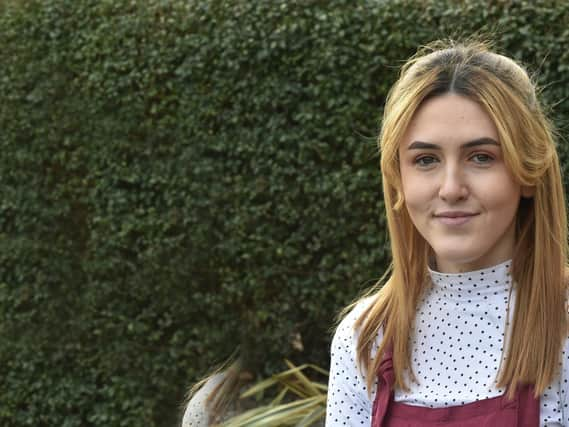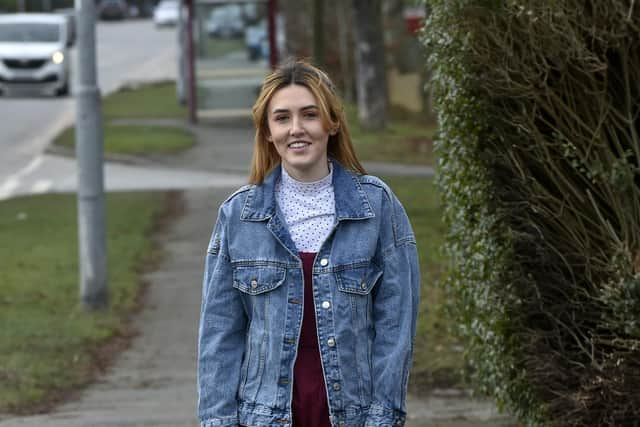Leeds woman who survived Manchester Arena attack tells of struggle with eating disorder during lockdown


Carys Crow, 21, of Otley, said she lost weight rapidly at the start of the pandemic after experiencing loneliness, isolation and stress while caring for her severely disabled sister.
Carys was diagnosed with anorexia and was treated in a specialist eating disorder unit at Seacroft Hospital for more than ten weeks last summer.
Advertisement
Hide AdAdvertisement
Hide AdNow she is recovering and is backing national campaign End the Eating Disorder Crisis Now, which is calling for more Government funding to help people with eating disorders.


The YEP launched its #speakyourmind campaign in 2016 to raise awareness of mental health issues and combat the stigma that sometimes exists around mental health.
Carys was aged 17 when she and a friend went to the Ariana Grande concert at Manchester Arena on May 2 2017 where 22 people were killed and hundreds injured by suicide bomber Salman Ramadan Abedi.
She was not physically injured, but was left traumatised and was diagnosed with complex post traumatic stress disorder around six months later.
Advertisement
Hide AdAdvertisement
Hide AdCarys said she had not suffered from an eating disorder before the pandemic started.
She said: "There were a lot of rules my eating disorder had made for me.
"The best way to describe it is an addiction to restriction.
"I was addicted to restricting myself more and more of the food I was eating every day and it just got less and less as it went on."
Advertisement
Hide AdAdvertisement
Hide AdDescribing the time when she needed help before calling her GP, Carys said: "I was crying over everything I was eating because of how guilty I felt."
Carys added: "There are thousands of people waiting for help for their eating disorder.
"Beat is the biggest eating disorder charity, and since the pandemic they have experienced a surge in demand of more than 140 per cent since February 2020."
Carys said that at the start of the pandemic she was a full time live-in carer for her 34 -year old sister Emma Danskin, who suffered a complex brain injury in a road traffic collision when she was aged 17.
Advertisement
Hide AdAdvertisement
Hide AdCarys said: "I lost a lot of weight and became really physically and mentally unwell."
Carys contacted her GP, who put her in touch with NHS service Connect.
She was diagnosed with anorexia on April 23 and started accessing an online weekly help group via Zoom at the end of May.
But her condition deteriorated and she was admitted to Seacroft Hospital's Newsam Centre, the Yorkshire Centre for Eating Disorders, on June 16.
Advertisement
Hide AdAdvertisement
Hide AdShe was treated at the hospital for more than ten weeks before being discharged on September 3.
Carys said: "Because I was so unwell I didn't really realise that I was unwell. My eating disorder had made me think I was OK.
"It made me believe that I hadn't lost that much weight, but obviously I had."
The End the Eating Disorder Crisis Now campaign is calling on the Government and clinical commissioning groups across the country to address what it claims is a lack of funding into eating disorders services nationwide.
Advertisement
Hide AdAdvertisement
Hide AdA spokesperson for NHS Leeds Clinical Commissioning Group, said: "In Leeds, adults with eating disorders can get support from Connect: The West Yorkshire Adult Eating Disorders Service.
"The aims of the Connect service are to increase the level of community based care for adults with eating disorders across West Yorkshire, provide a full team approach to care and treatment, provide community care closer to home, reduce the need for lengthy inpatient treatment, reduce the need for travelling long distances to access care.
"The service provides early intervention, outpatient, inpatient and intensive home- based treatment for adults with eating disorders (anorexia nervosa and bulimia nervosa), from across West Yorkshire.
"Access to Connect is through referral from a health professional, including GPs.
Advertisement
Hide AdAdvertisement
Hide Ad"Under 18s who may have a range of eating problems can get support from the Leeds Children and Young People Eating Disorder Service."Visit the MindMate website for information about how a young person can get support if they have an eating disorder."